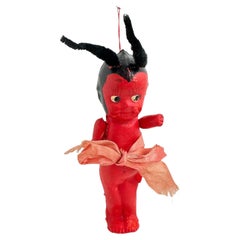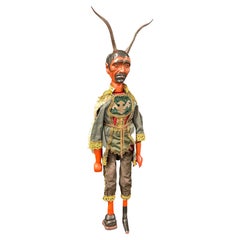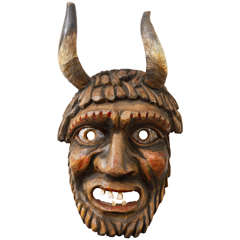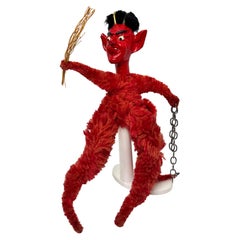Antique Krampus
1910s German Folk Art Antique Krampus
Wire
Early 20th Century Austrian Folk Art Antique Krampus
Composition, Metal, Brass
Recent Sales
Early 20th Century Swiss Folk Art Antique Krampus
1920s Austrian Folk Art Antique Krampus
Composition, Wire
Early 20th Century French Neoclassical Antique Krampus
Lead
Early 20th Century Austrian Folk Art Antique Krampus
Composition, Metal
Early 20th Century Austrian Folk Art Antique Krampus
Composition, Metal, Brass
Early 20th Century Austrian Folk Art Antique Krampus
Composition, Metal, Brass
People Also Browsed
Early 20th Century Japanese Meiji Antique Krampus
Wood
2010s English Antique Krampus
Marble, Gold Leaf
1930s German Folk Art Antique Krampus
Wire
20th Century Austrian Folk Art Antique Krampus
Composition
1930s German Folk Art Antique Krampus
Mercury Glass
20th Century Austrian Folk Art Antique Krampus
Composition
1930s German Folk Art Antique Krampus
Wire
1910s German Folk Art Antique Krampus
Wire
20th Century Austrian Folk Art Antique Krampus
Composition
20th Century German Folk Art Antique Krampus
Composition
1930s German Folk Art Antique Krampus
Wire
1930s German Folk Art Antique Krampus
Wire
Early 20th Century Folk Art Antique Krampus
Ceramic, Wool, Cotton
21st Century and Contemporary Antique Krampus
Foil
1910s German Folk Art Antique Krampus
Wire
Early 20th Century German Folk Art Antique Krampus
Glass
A Close Look at Folk-art Furniture
Folk art is a genre of art that shares the creator’s traditions, offering not just an artistic display but an opportunity to learn about a culture. Antique, new and vintage folk art typically reflects a heritage or location. It can include utilitarian objects and handmade art as diverse as weather vanes, duck decoys, portraiture and paintings, carnival art and quilts.
Quilts are a quintessential part of American folk art but their roots are international, with quilting dating back to Ancient Egypt. The practice spread to Europe and was especially prominent in the Middle Ages, with one of the oldest surviving examples being the Tristan quilt made in Sicily in the 14th century. They were made as bedcovers and clothing, including as a layer for knights to wear beneath their armor. Native American folk art includes functional objects reflecting their heritage, such as baskets, textiles and wooden pieces.
Elsewhere, the vast range of work associated with Mexican folk art includes masks made by Mexican craftspeople for traditional celebrations and ceremonial dances. Mexican masks are part of the country’s folk-art traditions that go back thousands of years and play a role in festivals and theater.
Works in the folk art tradition are valuable because of the skills involved, like weaving, hand-carving wood and even stonework. Many folk artists are self-taught, while some train as apprentices within their community. By using available materials and taking a personal approach to their creations, artists ensure each piece is unique and conveys a story.
During the Great Depression, artistic materials in America were hard to come by, so artisans used discarded wood from cigar boxes and shipping crates to make highly stylized, notched pieces — most often picture frames and boxes — that are today sought after by collectors. This folk art style is called tramp art and was popular from roughly 1870 until the 1940s.
Folk art brings vibrant culture and traditions into your home. Browse an extensive collection of antique, new and vintage folk art on 1stDibs.



